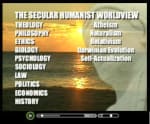Humanism
Humanism: Some Thoughts from the Humanist Manifesto I
Humanism was “codified” by 34 of its leaders in 1933. Although many other versions of humanism have appeared before and since, here are some excerpts from the original Humanist Manifesto I:
FIRST: Religious humanists regard the universe as self-existing and not created. SECOND: Humanism believes that man is a part of nature and that he has emerged as a result of a continuous process. THIRD: Holding an organic view of life, humanists find that the traditional dualism of mind and body must be rejected. FOURTH: Humanism recognizes that man's religious culture and civilization, as clearly depicted by anthropology and history, are the product of a gradual development due to his interaction with his natural environment and with his social heritage. The individual born into a particular culture is largely molded by that culture. FIFTH: Humanism asserts that the nature of the universe depicted by modern science makes unacceptable any supernatural or cosmic guarantees of human values. Obviously humanism does not deny the possibility of realities as yet undiscovered, but it does insist that the way to determine the existence and value of any and all realities is by means of intelligent inquiry and by the assessment of their relations to human needs. Religion must formulate its hopes and plans in the light of the scientific spirit and method. EIGHTH: Religious Humanism considers the complete realization of human personality to be the end of man's life and seeks its development and fulfillment in the here and now. This is the explanation of the humanist's social passion. NINTH: In the place of the old attitudes involved in worship and prayer the humanist finds his religious emotions expressed in a heightened sense of personal life and in a cooperative effort to promote social well-being. TENTH: It follows that there will be no uniquely religious emotions and attitudes of the kind hitherto associated with belief in the supernatural. FINAL PARAGRAPH: So stand the theses of religious humanism. Though we consider the religious forms and ideas of our fathers no longer adequate, the quest for the good life is still the central task for mankind. Man is at last becoming aware that he alone is responsible for the realization of the world of his dreams, that he has within himself the power for its achievement. He must set intelligence and will to the task.
Humanism: A Belief with no Purpose or Objective Values
Humanism holds that the universe exists for no purpose. We are the result of a blind and random process that does not necessitate any kind of meaning. Humanism differs from the more extreme philosophy of nihilism, in that life can have a meaning if we assign a meaning to it. Life is only worth living if we ourselves make it worthwhile and enjoyable. Humanism maintains that no objective or universal values exist. A person may be moral if he or she creates a system of values and lives according them. A humanist would maintain that no one is obligated to be moral. Therefore, humanism fails to provide moral objections to immoral behavior. Obviously, if no moral absolutes exist, you can't demonstrate that anything is wrong or evil. Thus, in a humanist society, no one can really judge or condemn the choices or actions of others.
Humanism: Life Without Real Meaning
Humanism is fostered by the teaching of evolutionary science, materialism and moral relativism in our popular media and public school system. We’ve removed God from the equations. Without God, we lose any transcendent purpose for the universe in which we live. Without God, we lose any transcendent purpose to give meaning to our individual lives. We are nothing more than bugs struggling with survival until we die. All the achievements, the sacrifices, the good and beautiful acts of some people, the ugly and dark acts of others, are ultimately futile efforts of life. Without God, we lose any possibility for life after death. When you remove the hope of heaven, you remove the ultimate value and purpose of life. What difference would it really make whether we lived like a Billy Graham or an Osama Bin Laden? Everyone's fate would be the same anyway. This is the ultimate outlook of those who base their belief system on humanism. Eat, drink and be merry – for tomorrow we die. Rather bleak, we think. Investigate for yourself.

